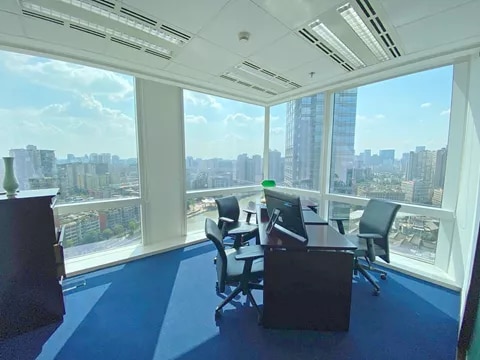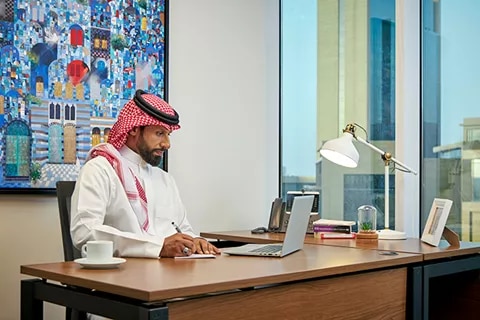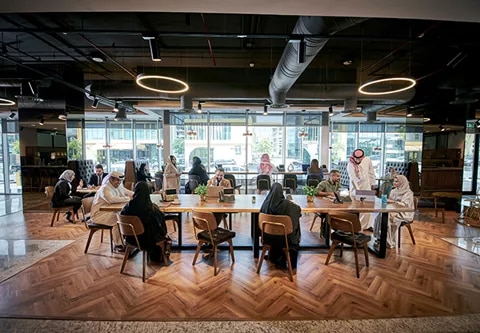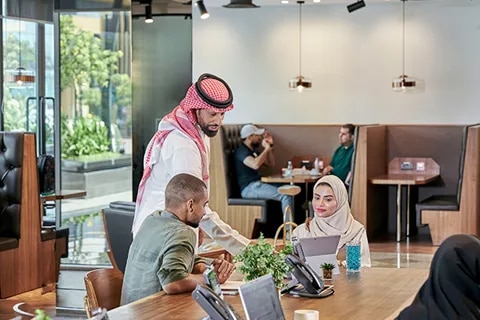The Role of Workspace Solutions Providers in Saudi Arabia’s SME Boom
By Precious Alocelja

In Saudi Arabia’s economic transformation under Vision 2030, small and medium enterprises (SMEs) are emerging as a critical engine of growth. By providing flexibility, scalability, and access to professional infrastructure, workspace solutions providers (flexspaces, coworking, serviced offices, virtual offices) are increasingly playing a foundational role in fueling this SME surge.
The rising tide of Saudi SMEs
SMEs in Saudi Arabia are growing at a remarkable pace. In 2023, the private non-oil sector expanded by 4.9 %, and the number of SMEs rose 3.1 % quarter-on-quarter, reaching approximately 1.3 million by year-end. In Q1 2025, new commercial registrations jumped 48% year on year, reinforcing momentum in the SME ecosystem. Meanwhile, in Q4 2024, Monsha’at reported a striking 67 % increase in commercial registrations, pushing the total number of registered businesses to 1.6 million a vivid signal of entrepreneurial energy across regions. These trends underscore how many new enterprises are seeking cost-efficient, agile infrastructure to support growth a demand that workspace providers are uniquely positioned to meet.
At the same time, the Saudi flexible workspace market is growing rapidly. In 2025, it is projected to reach USD 619.3 million, and by 2033 it may expand to over USD 1,438 million, reflecting a compound annual growth rate (CAGR) of 8.05 %. Another market analysis suggests that Saudi’s flexible office market could grow with a CAGR of 10.88 % between 2025 and 2030, reaching USD 2.62 billion. Such robust growth is driven in part by a rise in startups, freelancers, remote and hybrid work models, and the government’s push to diversify the economy away from oil.
Thus, the confluence of SME expansion and workspace demand presents a meaningful opportunity: as young businesses proliferate, they require infrastructure that is lower cost, more flexible, and scalable without heavy capital investment.
How workspace providers address SME pain points
SMEs often face real constraints when it comes to physical infrastructure. Traditional office leases demand long terms, high security deposits, capital expenditure on fit outs, and then the operational burden of maintenance, utilities, IT systems, and staffing. For an early-stage business, this burden can distract from product development, customer acquisition, or hiring.
Workspace solutions providers help alleviate these challenges:
- Scalability and flexibility: SMEs can begin with minimal space and scale up (or down) as needed, without being locked into long-term leases.
- Shared essential services: Access to reception, meeting rooms, IT, security, and administrative support without needing to procure each service independently.
- Immediate move-in: Many workspaces are pre-fitted and ready to use, reducing delays in operations.
- Professional image: Using premium addresses, well-serviced offices, or coworking setups gives small firms legitimacy in the eyes of clients or partners.
These advantages enable SMEs to allocate resources where they matter most innovation, marketing, product, and talent rather than facility management.
Supporting scale, expansion & market reach
As firms evolve, their workspace needs evolve too. Workspace providers can support that evolution in key ways:
- Modular growth: Instead of relocating entirely, SMEs may expand within the same building or across the same provider’s network.
- Network access: Some operators permit cross-location access useful for businesses wanting presence in multiple cities.
- Additional services: Providers may bundle services like communication, mail handling, virtual office support, or local administrative assistance.
- Hybrid work enablement: With hybrid work models becoming commonplace, providers enable flexible desk usage, hot-desking, and shared meeting zones.
This growth aligned support reduces friction for SMEs entering new geographies or shifting their working model.
Regional reach and spillover
While major cities like Riyadh and Jeddah are obvious hubs, the SME boom is extending to second tier cities and smaller municipalities. Workspace solutions providers can catalyze such growth by offering serviced offices or coworking hubs outside primary zones. This decentralization supports local entrepreneurship without forcing founders to relocate.
Moreover, in new urban developments and innovation zones (e.g., smart districts, tech parks), flexible workspaces act as plug in infrastructure, letting startups, consultants, or project teams set up quickly without needing to build permanent real estate from day one.
Challenges & what providers must get right
The role of workspace providers in shaping the SME ecosystem is promising, but several challenges must be addressed:
- Regulation & zoning: Some cities or zones may not yet permit mixed-use or flexible leasing models, licensing and compliance rules must adapt.
- Cultural mindset: Some SME owners and traditional firms may perceive shared or serviced offices as less prestigious or private; providers must demonstrate reliability, security, and brand quality.
- Cost sustainability: To maintain premium amenities, technology, and staffing, providers depend on utilization and operational efficiency. Underuse can erode margins.
- Strategic footprint: Providers need smart location strategy balancing demand corridors with oversaturation risk in mature markets.
Providers that balance adaptability with service excellence and location strategy will be better positioned to support the Saudi SME wave.
Flexible workspaces as catalysts for SME growth
As Saudi Arabia’s SME sector expands, the demand for workspace flexibility and professional infrastructure continues to grow. Many providers are adapting to this shift by offering environments that combine scalability, technology, and credibility, qualities that are particularly important for small and growing businesses.
Among these providers, Servcorp plays a notable role in supporting the country’s entrepreneurial ecosystem. With its network of offices across Riyadh, Jeddah, and Al Khobar, Servcorp offers SMEs access to high-quality serviced offices and virtual office solutions that help them operate efficiently and professionally. These offerings provide essential business infrastructure, from reliable IT systems and reception services to prestigious business addresses, without requiring significant upfront investment or long-term commitments.
This kind of flexibility allows startups and smaller enterprises to establish themselves quickly in prime business locations, focus on growth, and adapt their workspace needs as they evolve. In this way, Servcorp contributes to a broader shift in Saudi Arabia’s business landscape, where workspace solutions providers are becoming key enablers of SME productivity and long-term sustainability.
Visionary & forward-looking
As Saudi Arabia continues to accelerate its Vision 2030 goals, SMEs remain at the heart of this transformation, driving innovation and new opportunities across every sector. Workspace solutions providers are evolving into the backbone of this progress, offering not only flexibility and scalability but also the credibility and infrastructure that growing enterprises need. Those that truly understand the ambitions of Saudi entrepreneurs will shape the country’s next business era one defined by collaboration, agility, and a shared vision of sustainable growth.





